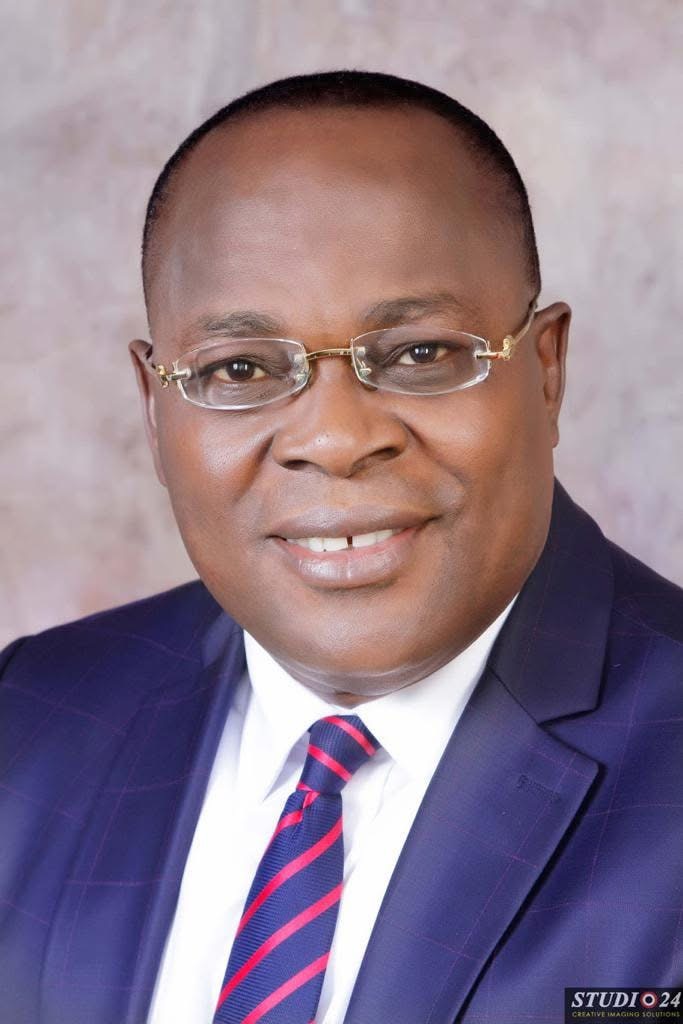
Education
UNN: Profile of new Vice Chancellor, Prof Simon Ortuanya

Professor Simon Uchenna Ortuanya emerged as the new Vice Chancellor of University of Nigeria, Nsukka, UNN, on Sunday.
Inya Agha Egwu, Acting Public Relations Officer, UNN in a statement made available to newsmen on Sunday, confirmed that “UNN Governing Council Appoints Professor Simon Uchenna Ortuanya as 16th Vice-Chancellor.”
“The Management of the University of Nigeria is pleased to announce the appointment of Professor Simon Uchenna Ortuanya, a distinguished Professor of Law, as the 16th Vice-Chancellor of the University.
“His appointment was ratified on Sunday by the Governing Council of the University, following a transparent and merit-based selection process chaired by Engr. Kayode Ojo, Chairman of the Governing Council, Egwu wrote.
Following the announcement, a Senior Special Assistant to Governor Peter Mbah, Mr Dan Nwomeh posted Ortuanya’s profile.
See details below:

The Man, Professor Simon Uchenna Ortuanya
Prof. Simon Uchenna Ortuanya, SJD, FCIArb, FCIA is a Professor of Law and Dean of the Faculty of Law, Enugu State University of Science and Technology.
As the Dean of Law, his unending passion for academic excellence and his Midas touch, propelled him into improving tremendously the learning environment of law graduates of the faculty of law, ESUT.
This is reflected in the quality of graduates of the faculty that can compete globally with their counterparts and thereby, repositioning the faculty in the world map.
Prof. Ortuanya is the immediate past Secretary to Enugu State Government (SSG) and also the Pioneer Director-General of South East Governor’s Forum.
A Former Commissioner of Education, Enugu State with numerous educational policies and laudable contributions towards an improved educational system of Enugu State under the past administration.
He had previously served as Special Assistant to the Minister of Information and culture of the Federal Republic of Nigeria. He is the also the Founding/Principal Partner of Prof S.U Ortuanya & Co, (Word Chambers), an innovative and leading 21st century top law firm that provides legal support services across diverse areas of law that touches various business sectors of the Nigerian economy.
He was called to the Nigerian Bar in 1988 after obtaining an LLB (Hons) degree from the University of Nigeria, Enugu Campus, in 1987. He obtained Master of Laws (LL.M) degree from University of Lagos in 1991 and a Doctorate in Law (SJD) from Loyola University Chicago School of Law in 2003. Between 2003–2005, he was a Visiting Scholar at Loyola University, Chicago School of Law in the United States of America (USA). He had served as the Director of Law Clinic and Associate Dean of the Faculty of Law, University of Nigeria, Enugu Campus between 2007-2011.
Between 2013-2016, he was Director of ESUT Legal Clinic. He was previously, the Head of Department of Private Law, Faculty of Law, Enugu State University of Science and Technology (ESUT), as well as Director of ESUT Law Clinic.
He has also served on the Human Rights Committee of the International Bar Association.
Prof. Ortuanya has published extensively in both local and international journals and has authored several top selling books including but not limited to Law of Evidence in Nigeria: Practice and Procedure; HIV/AIDS Law and Policy in Nigeria; Public Health Law and Policy in Nigeria; Human Rights Law in Nigeria: Law, Practice and International Perspectives; Health Law Legislation in Nigeria and Fighting on the Side of Law and Justice: Legal Essays in Honour of Professor G.O.S. Amadi among others.
He is a specialist in Law of Evidence, Criminal Law, Human Rights Law, Legal Drafting, Public Health Law and Corporate Law. Prof. Ortuanya is a Fellow of the Nigerian Institute of Chartered Arbitrators; Fellow, Chartered Institute of Administration of Nigeria; Member of American Society of Law, Medicine and Ethics; a member, American Health Lawyers Association and a member of International Bar Association (IBA)among many others.
Education
Enugu Leads Nigeria’s Shift to Smart Green Schools

… Acknowledges teething challenges, but resolved to deliver
… Justifies 33% budgetary allocation to education
Enugu State, on Monday, ushered in a new epoch in its history and the life of the state’s children, as it officially began the transition from existing primary and junior secondary schools to Smart Green Schools, Governor Peter Mbah’s signature initiative in the South East state.
In a broadcast to usher in the new era Monday morning, Governor Mbah said the shift from old school structures and learning by memorisation to world-class infrastructure and experiential learning had become imperative to equip Enugu children with knowledge and skills to compete in the global economy, stressing that “we are no longer a state waiting to be saved – we are a state shaping the future on our own terms.”
“Africa today is the youngest continent in the world. More than 60% of our people are under the age of 25. By 2050, our population will reach 2.5 billion, and one in every three young people on earth will be an African. This is a stark reminder that our future will be built by young hands.

Enugu Smart Green School
“This is not just a statistic; it is a summons. It means that the destiny of African nations rests on what we nurture in the minds and hearts of our children.
“If we raise them well and leave them opportunity, when they inherit tomorrow; when they own it; they will shape it and defend it. If we fail them, no amount of slogans will save us,” he stated.

Mbah said his administration’s slogan, “Tomorrow is here,” was not just a catchphrase for Enugu, but “a covenant with that future,” adding that Africa’s sovereignty rests on the quality of its human capital.
“It is the recognition that the sovereignty of our state, of Nigeria, and indeed of Africa, will be determined by the strength of our young people – their ability to think critically, to innovate, and to act with integrity.
“Our sovereignty begins in the classroom. It begins with how we choose to welcome the child into the world. And this takes time, care – and investment,” he said.
Citing his personal experience where he had to journey from “the slums of Port Harcourt, where every day was a struggle and nothing was guaranteed,” Mbah said education and resilience were his “passport to a life of possibility.”
He, however, maintained that Enugu children did not have to go through such ordeals on account of economic circumstances, insisting that education must be treated as a public right.
“At home and at school, when a community receives and educates each child as a whole human being, it is akin to public service at the deepest level.
“The habits a child rehearses – attention, curiosity, patience, empathy, self-belief – become the civic habits of our culture. A school day shaped by rhythm, responsibility, and care quietly trains the nervous system for self-regulation and the social muscle for cooperation.
“Those capacities later show up as lower violence, stronger communities, and a public square that can tolerate disagreement without tearing itself apart.
“The school, then, is not just a service; it is a commons where the human village renews itself,” he added.
Noting that the Smart Green Schools represent the most personal and transformative project of his leadership, he explained, “They are not only schools – they are my promise of a new society; my covenant with the Enugu child. In them, Tomorrow Is Here finds its truest form.
“Each of the 260 schools is designed as a complete ecosystem for learning. ‘Smart’ means integrating technology, critical thinking, and problem-solving into every subject. Each has about 25 digitally-connected modern classrooms, ICT centres, robotics and AI labs, e-libraries, and spaces for experiential learning.
“They are ‘green’ because they have renewable energy sources and smart farms where children plant, grow, and harvest, learning agriculture not as theory but as practice.
“And they are inclusive. Every child is provided with free uniforms, books, meals, and tablets. Each school has its own medical clinic, reliable water systems, and community halls that anchor the school in village life. Housing for teachers is on-site so that the best educators live within the communities they serve, ensuring continuity of care and commitment.
“Smart Green Schools are not just an investment in classrooms, but in the soul of our people. The habits a child rehearses, of curiosity and collaboration, become the civic habits of the culture. A generation raised in schools of innovation will build an economy of innovation. A generation raised in classrooms of fairness will create a politic of justice.
“So, those buildings are beyond mere bricks; we see in them children eagerly looking forward to the future.”
He said that while a child could pass through six years of schooling and still be limited to memorising theories on a chalkboard under the old system of learning, “in the new model, the classroom is a creativity hub; learning becomes experiential; theory meets practice, and knowledge is translated into tangible skills; children are able to put into practice what they have learnt.”
The governor, however, acknowledged some challenges in building the 260 new schools simultaneously, but restated his administration’s resolve to see the initiative through.
“This journey has not been easy. We know that every Smart Green School is not yet complete. There have been setbacks, delays, and challenges to overcome.
“While some schools will open today, some will open next week, and yet some more in a fortnight.
“We do not claim perfection. What we do claim is resolve.
“We set out with a bold vision, and boldness sometimes requires a little more time. But by all means, every school shall be open this term. No school’s academic calendar will be interrupted. We have planned for every contingency.
“Make no mistake: we will deliver. Because attending a Smart Green School – even if it means waiting a few more weeks – is worth it. It is the transformation of a lifetime for our children, and we ask for your patience as we finish the work. We’re doubling down on our commitment,” he assured.
He urged the communities to protect the schools as if they were their own children.
“These schools are a once-in-a-lifetime opportunity to bring world-class education home to Enugu. Cherish them. Defend them. Guard them as a community. Take shared responsibility for our future, which is walking in on two small feet every time a child enters these gates.
“Support the teachers – the custodians and guardians of our future farmers, entrepreneurs, nurses, artists, engineers, lawyers, and leaders.
“They are the cornerstone of this transformation. Equipment and buildings matter, but machines do not teach; people do,” he stated.
He added that his administration has invested in continuous professional development, in mentorship programmes, and in the tools teachers need to deliver child-centred and competency-based learning.
Mbah insisted that his administration’s investment of 33 percent of the state’s budget in education was worth it, as “the wealth of human potential is the truest capital of our society.”
Education
FG reintroduces History as compulsory subject in primary, secondary schools

The Federal Government has reintroduced Nigerian History as a compulsory subject in the basic education curriculum to strengthen national identity, unity, patriotism, and responsible citizenship.
The Federal Ministry of Education announced the introduction in a statement on its official X account on Wednesday.
“For the first time in decades, Nigerian pupils will study History continuously from Primary 1 to JSS3, while SSS1–3 students will take the new Civic and Heritage Studies, integrating History with Civic Education,” the statement read.
“Primary 1–6: Pupils will learn about Nigeria’s origins, heroes, rulers, culture, politics, economy, religions, colonial rule, and post-independence governance.
“JSS1–3: Students will study civilisations, empires, trade, European contacts, amalgamation, independence, democracy, and civic values.”
According to the Ministry of Education, this reform is a priceless gift to the nation, reconnecting children with their roots while inspiring pride, unity, and commitment to national development.

The ministry has released the revised curriculum and will retrain teachers, provide resources, and strengthen monitoring.
Education
NECO releases 2025 SSCE results, records only 60% pass rate

The National Examinations Council has released the 2025 Senior School Certificate Examination (SSCE internal) results, 54 days after the last written paper.
NECO Registrar, Prof Ibrahim Wushishi, who announced the release of the results at a press conference in Minna, Niger State, on Wednesday, said out of the 1,358,339 candidates who sat for the June/July exercise, 818,492, representing 60.26 per cent, scored 5 credits and above, including Mathematics and English.
Wushishi stated that the number of candidates with five credits and above, irrespective of Mathematics and English is 1,144,496, representing 84.26 per cent.
He said, “Number of candidates that registered for the examination is 1,367,210, representing 685,514 Males and 681,696 Females.
“Number of candidates that sat is 1,358,33,9 representing 680,292 Males and 678,047 females.
“Number of candidates with five Credits and above, including Mathematics and English is 818,492 representing 60.26%.

“Number of candidates with five Credits and above, irrespective of Mathematics and English is 1,144,496 representing 84.26%.”
Recall that the 2025 Senior School Certificate Examination was conducted from Monday June 16, to Friday July 25, 2025.
Wushishi stated that the number of candidates with special needs was 1,622, out of which candidates with hearing impairment were 586 males and 355 females, and candidates with visual impairment were 111 Males and 80 Females.
On the number of examination malpractice cases, the registrar noted that in the 2025 SSCE internal, the number of candidates involved in various forms of “malpractice was 3,878, as against 10,094 in 2024, which shows a reduction of 61.58 per cent.”
He added, “During the conduct of the 2025 Senior School Certificate Examination, 38 schools were found to have been involved in whole school (Mass) cheating in 13 States. They will be invited to the Council for discussion, after which appropriate sanctions will be applied.
“Similarly, nine Supervisors: three in Rivers, one in Niger, three in FCT, one in Kano and one in Osun States were recommended for blacklisting due to poor Supervision, Aiding and Abetting, Lateness, Unruly behavior, Assault, and Insubordination.
“I wish to also draw your attention to a case in Lamorde Local Government, Adamawa State involving eight Schools which were affected by a communal clash resulting in the disruption of our examinations from 7th to 25th July, 2025. A total of thirteen Subjects and twenty-nine Papers were involved.
“We have since commenced talks with the State Government with a view to conducting the examinations for the affected Schools.”
He announced that in view of the reviewed curriculum, which is currently being implemented, NECO will conduct the SSCE examination on only 38 subjects, which will reduce the waiting time for the results.
While providing a breakdown of performance by states, he noted that Kano came top with 68,159, representing 5.020 per cent of candidates scoring five credits and above, including English and mathematics.
Lagos came second in performance with 67,007 or 4.930 per cent of candidates, scoring five credits and above, including English and mathematics, while Oyo came third with 48,742 candidates scoring five credits and above, including English and mathematics.
The least performing centre was Gabon, with no candidate scoring five credits and above, including English and mathematics.
The Examination Council recently announced the transition from the Paper-Pencil Test model, known as the PPT model to Computer-Based Test Model, with a number of private and public schools taking part in the first phase of the transition.
-

 News1 day ago
News1 day agoBREAKING: Tinubu grants 175 persons presidential pardon
-

 News2 days ago
News2 days agoAtiku backs Sowore-led protest, demands immediate release of Nnamdi Kanu
-

 News3 days ago
News3 days agoWhy I resigned, Nnaji explains, denies wrongdoing
-

 News1 day ago
News1 day agoCertificate Scandal: CASER asks Enugu Attorney General to prosecute Ex-minister Nnaji
-

 News3 days ago
News3 days agoCooking Gas: Scarcity, price hike artificial, middlemen exploiting customers — NALPGAM
-

 News2 days ago
News2 days agoRMRDC targets 30% Value Addition Policy on Export of Local Raw Materials
-

 News2 days ago
News2 days agoPresidency rejects World Bank report claiming 139 million Nigerians live in poverty
-

 News1 day ago
News1 day agoTinubu nominates Kogi’s Prof. Amupitan as INEC chairman



















